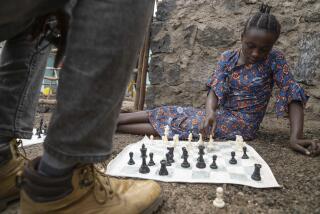Chess Club Is King at Day School
- Share via
In a world where games often ping and whistle, you can almost hear the sound of thinking as the young students at Beth Hillel Day School lean over their chessboards.
Chess club, which meets three days a week at the private elementary school in Valley Village, counts 15 of its 50 students as members.
“We don’t have a baseball team, we don’t have a football team, but for a little day school like this to have a chess club gives the kids a sense of school spirit and identity,” said Susan Isaacson, school director.
Attorney Lisa Miller, the mother of 8-year-old Max, a third-grader and club member, organized the club this fall to keep the boys and girls interested and to teach them how to play first-rate chess. Her motive is one that resonates with parents everywhere. “Better to light a single candle,” she said, “than to curse the darkly seductive electronic games.”
Miller, 36, put the club together the way she might prepare a legal brief -- with a clear sense of the desired outcome and meticulous attention to detail. She found Timothy Taylor, of Beverly Hills, an international chess master (one of a handful in Los Angeles) to tutor the team. “They call him the Pete Sampras of chess,” she said.
She also enlisted the help of four chess-loving teenagers from nearby North Hollywood High School’s highly gifted magnet program. They serve as senior directors of the club’s chess lab, where they teach the 1,500-year-old game to youngsters half their age. Miller gave them each the title “senior lab director” because she knew it would look good on their college applications.
That the club members are Jewish, while their mentors include a Muslim and Christians, may be noteworthy in a different context. But everyone involved with the team is a citizen of chess, where one’s status is based on the ability to think ahead and the sole creed is that it is good and just to besiege the other player’s king.
Taylor, 49, explained that in chess, nothing catastrophic happens to the king: “When the rules were codified in the 15th century, they believed in the divine right of kings and you couldn’t kill the king.”
During a recent chess lab, 15-year-old Mohammad Guiamelon, one of the senior lab directors, patiently talked 6-year-old David Gottlieb through a game. When Mohammad first arrived as a mentor, some of the children mispronounced his name “Bahama.” They eventually got it right, just as they are now mastering such chess essentials as how to castle and how to do chess notation, the standardized method for recording the moves in a game.
“Do you want to lose your knight?” Mohammad asked David, when the first-grader inadvertently put his knight at risk. “What are the ways you can guard your knight?” the teenager prompted.
David likes checkers as well as chess. “Y-E-S,” he answered, when asked if chess is harder. But he prefers it, because its sophisticated moves and strategies make the simple jumping of checkers seem, well, simple.
Mohammad, who aspires to an Ivy League school or top-notch California college, used to have chess skirmishes with his brother, he said.
“It’s a way to express yourself creatively,” Mohammad said of the game. “Each individual piece has a personality, and how you play reflects your personality.” Of his style, he said: “I’m very aggressive. If I see an opening, I just go for the jugular.”
There are challenges to teaching the game to children, some of whom have yet to master long division.
“The hardest thing to teach them is patience,” Mohammad said. “They just want immediate gratification.”
Fellow lab director Robert Rose, 16, who is active in his Woodland Hills church and aspires to attend West Point, has been playing chess for about 10 years.
“Chess helps build logic skills and thinking skills, and I wanted to help these kids out,” he said.
Chess master Taylor said the game does many things for youngsters who master it: “It allows you to imagine something and then make it real, so it expands your imagination.”
Often chess leads to other discoveries, as players begin reading the many books on the game and looking into the lives of the great champions, many of them Russian. “It introduces you to the whole world,” said Taylor, who has written three books on chess and two novels.
The teenagers are an important addition to the club, he said: “They’ve shown them the fun side of the game. They’re very relaxed and easygoing, and they let them win a little bit.”
Isaacson is pleased the students are interacting with such fine role models.
Young Max Miller is proud of his mother for bringing the club to life. But he isn’t sure chess is the intellectual five-in-one tool his elders believe it to be. Asked if chess helps him concentrate, Max thought for a moment and said: “What helps me concentrate is PlayStation 2.”
Lisa Miller writes and distributes a weekly chess club newsletter whose tone is shamelessly rah-rah, she concedes. It includes the name of the chess student of the week, a title with a prize attached as well as glory.
“Mostly, this gets sent to a lot of grandparents,” Miller said of the newsletter. And she made a Hanukkah prediction: “There are going to be a lot of chess sets under a lot of menorahs this year.”


